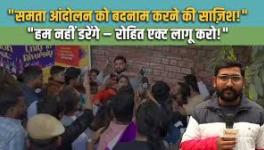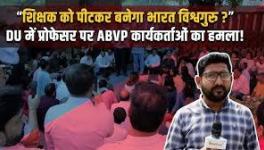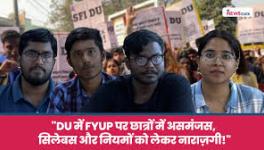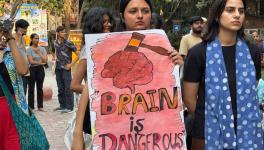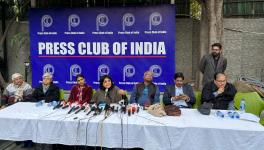DU Recommends Removal of Dalit Writer-Activist Kancha Ilaiah’s Books from Syllabus
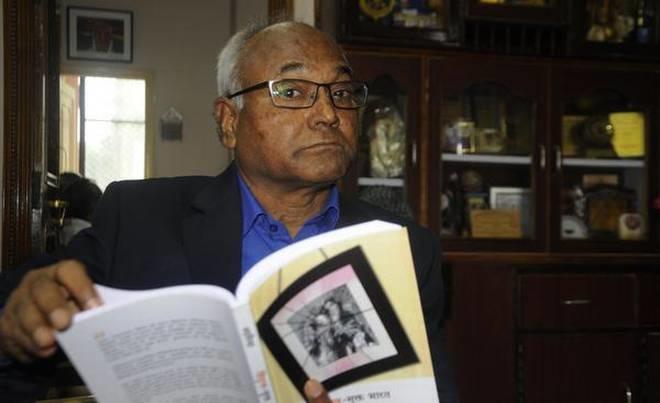
Delhi University on Wednesday recommended removal of books of Dalit writer-activist Kancha Ilaiah from its political science syllabus over the “controversial content” in the books, while also suggesting discontinuation of the use of the word ‘Dalit’ in academic discourse.
In a meeting held by the varsity’s Standing Committee on Academic Matters, professor Hansraj Suman said, there was a discussion on the syllabus of nine master’s courses.
The three books being objected to are: Why I am not a Hindu, God as Political Philosopher: Buddha's Challenge to Brahminism, and Post-Hindu India: A Discourse in Dalit-Bahujan Socio-Spiritual and Scientific Revolution.
Professor Geeta Bhatt, member of Delhi University (DU) academic council, has said that Ilaiah’s books were his understanding of Hindu faith and “there is no empirical data to establish his understanding.”
“The political science department should look into its syllabus. These books by Kancha Ilaiah are vitriolic towards Hindu faith,” Bhatt said, adding that the author’s writing is unsubstantiated by facts.
She also said that Ilaiah wrote about how “Hindutva school wants me to treat my Christian and Muslim brothers as enemies”, and how “the very sight of the saffron tilak harasses him”.
“He has a problem with a word like tapasya. It is all about his mind, and his understanding of a faith. As an academic piece, there is no content in it, and no reason to teach it. His every book has this vitriol,” Bhatt said. The books by Ilaiah were also objected to in the last meeting.
Ilaiah told Newsclick, “These books are a part of the syllabus of foreign universities like the Columbia University and even other universities across India like Jawaharlal Nehru University (JNU). They are used in Delhi University as reference books as well as course material. It is a very unfortunate move. Under the BJP government, academic autonomy is getting destroyed. They do not want plural ideas in academic discourse.”
The protesting teachers have sought clarification on the merit of Ilaiah’s work, and on why it was important to include his books in the syllabus. They also demanded the removal of the texts or a counter narrative to be placed before the students.
Speaking to News18, the political science head of department, professor Veena Kukreja, said: “There were some objections raised that considered the work of Kancha Ilaiah controversial. We were told that if we want to teach it, then there should be a counter narrative as well. However, some wanted its removal. We are a democratic body, and the teachers and experts concerned will sit, decide and justify why we teach Ilaiah. It will be pursued democratically.”
According to Ilaiah, his book Post-Hindu India: A Discourse in Dalit-Bahujan Socio-Spiritual and Scientific Revolution was introduced in University of Columbia in 2012 when the “same group of teachers” had requested the University to not include this book in their curriculum, as they believed this book blamed Hinduism. “If I talk about caste and the inequalities and the discrimination in the system, it is not (called) blaming the religion” said Ilaiah.
“Post Hindu India, which, again, they are saying is against Hinduism, and therefore it should not be taught. But it is a book of my 10 years’ research in the villages, tribal areas, and it deals with every communities’ interpersonal relationships, work ethics, tools that they use, productivity and the food culture,” he added.
He elaborated with an example. “For a very long time, working communities who worked in the agricultural sector were never vegetarian, but the Brahmins and the Banias were vegetarian for a long time. It says, if some people want the whole nation to be vegetarian, many cannot sustain. Because, majority of who do the hard work need protein. Therefore, it says that if the Hindu idea is vegetarian, these people are outside this framework, and the BJP/RSS work on vegetarian nationalism. If a religion is scared of the analysis of its people, then how can it survive?”
Reacting to his work being termed as “opinionated” and lacking substantial references, he said, “God as Political Philosopher: Buddha's Challenge to Brahminism is my PhD thesis. In JNU, one teacher asked the students to compare, Gandhi’s Hind Swaraj, Why I am not a Hindu, and Ambedkar’s Annihilation of Caste. Even Gandhi’s Hind Swaraj has no references or no book quotes, he wrote his philosophical understanding his way. Today, they are saying I just wrote opinion and it is not research. How can they say that my thesis, which is approved by various academicians, is an opinionated book? Gautam Buddha’s political philosophy is not my opinion!”
“Therefore, I think BJP and RSS, under their control, the Human Resource Development ministry is pushing the universities into, uncreative, non-serious unidimensional teaching centers, which is not good for the people or for the nation,” he added.
Reacting to the row, DU professor Sanjeev Kumar HM said, “We should teach everything to the students. This is the basic idea of a university. Let the students learn, and decide.”
Another paper that has created some discomfort is: The Militias of Hindutva: Communal Violence, Terrorism and Cultural Policing by Christophe Jaffrelot. Teachers have objected to the text for the English department, saying that Indian voices were being ignored.
The committee had met on Wednesday, ahead of the Academic Council meeting. Various departments are expected to revise the syllabi of their postgraduate courses for the next session when the choice-based credit system (CBCS) format kicks in. As of now, the CBCS format is functional at the undergraduate level. Under this system, students will have the choice to select their courses, which are categorised as ‘core’, ‘elective’ and ‘open elective’.
The issue of objections being raised against the texts, however, is not new. In the last meeting, teachers had objected to two books — professor Nandini Sundar’s Subalterns and Sovereigns: An Anthropological History of Bastar, and professor Archana Prasad’s Against Ecological Romanticism: Verrier Elwin and the Making of an Anti-Modern Tribal Identity (2003).
Get the latest reports & analysis with people's perspective on Protests, movements & deep analytical videos, discussions of the current affairs in your Telegram app. Subscribe to NewsClick's Telegram channel & get Real-Time updates on stories, as they get published on our website.









